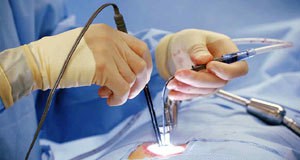Endoscopic spine surgery is a minimally invasive surgical intervention which successfully treats discus hernia and enables quick recovery.
Discus hernia is a medical condition affecting the spine in which a tear in the outer, fibrous ring of an intervertebra disc allows the soft, central portion to bulge out beyond the damaged outer ring.

A herniated disc can irritate nearby nerves and result in pain, numbness or weakness in an arm or leg.
The most common signs and symptoms of a herniated disc are: arm or leg pain, numbness or tingling and muscle weakness.
The aim of the operation is to free the compressed nerve by removing the prolapsed part of the disc.
Who are the candidates for endoscopic discus hernia operation?
Candidates for surgical treatment of discus hernia are patients experiencing severe pain along the leg which can not be relieved by analgesics or physical therapy and which has persisted for a longer time.
Endoscopic surgery is not possible in patients with degenerative deformities of the spine (scoliosis, narrowing of the spinal canal,etc).
How is the procedure carried out?
Endoscopic spine operation is a surgical intervention which is carried out by using special instruments and with only one incision under X-ray control and special instruments which are used to reach the painful sites. The patient can be treated without injuries of the muscles and ligaments. In endoscopic herniated disc surgery,the instruments are inserted through the natural openings between the bones.It is possible to do so, because the instruments are only 7 mm in diameter.
Recovery after the operation
After the intervention, patients are advised to take a three-weeks rest, but recovery usually does not take too long.
Adequate period of rehabilitation and adaption to a new condition is particuarly important for those who perform physical jobs. They are advised to avoid making certain moves, like bending, lifting more than 10 kg, rotations in the spine and long sitting which may provoke discus hernia again.
Endoscopic spine operation, thanks to excellent visualization maximally reduces the risk of complications.
Cervical discus hernia (herniated cervical disc)
Apart from standard discus hernia, there is also cervical neck discus hernia which is successfully treated surgically.
It is a consequence of the disc slipping from its place into inter vertebral space.
The most common symptom of discus hernia is pain in the neck which may radiate along the arm and towards the occiput.
These symptoms require additional examinations which include standard cervical spine radiography, electromiography, computerised tomography and magnetic resonance of the cervical spine.
The safest and the least invasive diagnostic method is magnetic resonance.
Surgical treatment of cervical discus hernia is indicated in patients who already suffer from muscle weakness and especially in those with progressive neurological impairment.The operation is also indicated in patients suffering from long-term painful conditions in the neck and arms which are not relieved by analgetics and physical therapy.
The Atlas general hospital is equipped with most modern equipment for diagnosing and treating cervical discus hernia.



